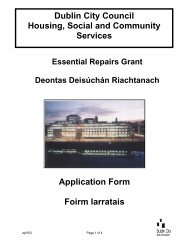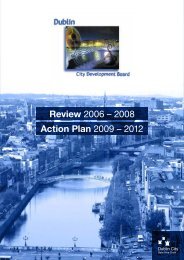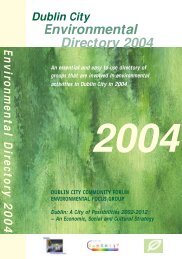A Dubliner's Guide to the Residential Tenancies Act 2004 ... - Dublin.ie
A Dubliner's Guide to the Residential Tenancies Act 2004 ... - Dublin.ie
A Dubliner's Guide to the Residential Tenancies Act 2004 ... - Dublin.ie
Create successful ePaper yourself
Turn your PDF publications into a flip-book with our unique Google optimized e-Paper software.
• Notices of termination<br />
• Invalid reasons for terminating a<br />
tenancy<br />
• Claims for costs or damages by a<br />
landlord or tenant regarding improper<br />
termination of a tenancy<br />
• Refunding deposits<br />
• Claims for rent arrears or o<strong>the</strong>r<br />
charges<br />
• Rent rev<strong>ie</strong>w problems<br />
• The charging of rent above market<br />
rent<br />
• Tenants or sub-tenants remaining in<br />
occupation despite receiving a valid<br />
termination notice<br />
• Complaints by neighbours regarding<br />
tenant behaviour<br />
• Claims for costs and damages from<br />
ei<strong>the</strong>r <strong>the</strong> landlord or <strong>the</strong> tenant arising<br />
from failures by ei<strong>the</strong>r party <strong>to</strong> comply<br />
with <strong>the</strong>ir obligations<br />
• Penalisation of tenants by landlords,<br />
e.g. for referring a dispute <strong>to</strong> <strong>the</strong> PRTB<br />
• Failure <strong>to</strong> comply with a<br />
determination order made by <strong>the</strong><br />
PRTB.<br />
The Board may refuse <strong>to</strong> deal with a<br />
dispute when it concerns a dwelling <strong>to</strong><br />
which <strong>the</strong> <strong>Act</strong> does not apply or if <strong>the</strong><br />
Board feels that <strong>the</strong> matter referred is<br />
frivolous or does not merit<br />
consideration. In <strong>the</strong>se cases, it must<br />
notify <strong>the</strong> person referring of its<br />
position and this person (<strong>the</strong> landlord,<br />
tenant, or o<strong>the</strong>r party) can make a<br />
submission as <strong>to</strong> why <strong>the</strong> Board<br />
should deal with <strong>the</strong> matter.<br />
Having considered this <strong>the</strong> Board can<br />
decide whe<strong>the</strong>r <strong>to</strong> deal with <strong>the</strong><br />
dispute. If <strong>the</strong> Board still refuses <strong>to</strong><br />
deal with <strong>the</strong> dispute <strong>the</strong>n those<br />
involved can appeal <strong>the</strong> decision <strong>to</strong> <strong>the</strong><br />
High Court.<br />
9.4 The Dispute Resolution<br />
Process<br />
The dispute resolution process<br />
involves <strong>the</strong> following stages:<br />
Stage 1:<br />
Ei<strong>the</strong>r mediation or adjudication as<br />
chosen by <strong>the</strong> part<strong>ie</strong>s. This process is<br />
confidential.<br />
Stage 2:<br />
A public hearing by a three person<br />
Tenancy Tribunal.<br />
9.5 Mediation or Adjudication<br />
The PRTB will operate a two-stage<br />
dispute resolution system. Stage 1<br />
consists of ei<strong>the</strong>r mediation or<br />
adjudication. Stage 2 is a hearing by a<br />
Tenancy Tribunal. Both mediation and<br />
adjudication are confidential <strong>to</strong> <strong>the</strong><br />
part<strong>ie</strong>s.<br />
If both part<strong>ie</strong>s agree <strong>to</strong> mediation, a<br />
PRTB Media<strong>to</strong>r will be appointed <strong>to</strong><br />
assist <strong>the</strong> part<strong>ie</strong>s <strong>to</strong> resolve <strong>the</strong><br />
dispute <strong>the</strong>mselves. The mediation<br />
process is supportive and nonconfrontational.<br />
It assists <strong>the</strong> part<strong>ie</strong>s <strong>to</strong><br />
explore each o<strong>the</strong>r’s respective<br />
positions and reach a resolution of <strong>the</strong><br />
dispute <strong>to</strong> which both are agreed.<br />
Exper<strong>ie</strong>nce shows that a resolution or<br />
agreement freely reached by <strong>the</strong><br />
part<strong>ie</strong>s is often preferable <strong>to</strong> a third<br />
party decision being imposed.<br />
Should ei<strong>the</strong>r of <strong>the</strong> part<strong>ie</strong>s decide not<br />
<strong>to</strong> use <strong>the</strong> services of a PRTB<br />
Media<strong>to</strong>r, or should <strong>the</strong> PRTB<br />
consider that <strong>the</strong> case is not suitable<br />
for mediation, a PRTB Adjudica<strong>to</strong>r will<br />
be appointed <strong>to</strong> examine <strong>the</strong> evidence<br />
A <strong>Dublin</strong>er’s <strong>Guide</strong> <strong>to</strong> <strong>the</strong> <strong>Residential</strong> <strong>Tenanc<strong>ie</strong>s</strong> <strong>Act</strong>, <strong>2004</strong> 21<br />
(Updated January 2008)
















